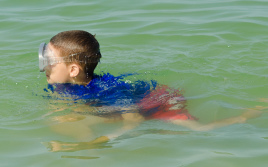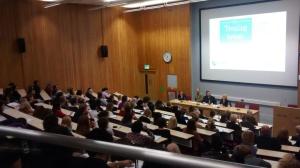Transcript
An estimated 1% of children worldwide are described as autistic. But what exactly does that mean? What is autism? And what are the promises, perils and politics of pharmaceutical intervention – could, should autism be treated?
This podcast features some of the key points raised by autistic people and their families at an event held at Kings College, University of London in late October 2014 to discuss the EU AIMS project (European Autism Interventions – A Multicentre Study for Developing New Medications). To play this edited version click the button above. A podcast of the full, unedited, event can be found here.
The event was chaired by Sandy Starr, Progress Educational Trust
Speakers were:
- Prof Ilina Singh, King’s College London
- Prof Declan Murphy, Institute of Psychiatry, King’s College London
- Prof Richard Ashcroft ,Queen Mary, University of London
- Virginia Bovell: Ambitious About Autism
- Russell Stronach: Autistic UK
Importantly, as Ilina Singh and Sandy Starr say, autism has multiple claims on those involved in this event, both speakers and participants. Many are living with autism or are parents of children with autism.
Autism affects how someone communicates with and relates to other people, it can also affect how they make sense of the world. But it is what is called a ‘spectrum condition’ – which means that different autistic people are affected in different ways depending where they are on the spectrum. And it’s a wide spectrum – some autistic people have above average intelligence and some have severe learning disabilities.
So, autism can be described (although as Richard Ashcroft said at the event, ‘when you have met one person with autism, you have met one person with autism’) but almost nothing is known about why one in a hundred of us will have the diagnosis. Are the causes genetic, hormonal, social,or is it something to do with the wiring of the brain – or is it a combination of those things? No one knows.
And that is why the EU AIMS project has been set up. It is the largest ever academic/industry collaboration aimed at understanding autism and finding new methods for developing drugs for the autism spectrum disorder.
It is led by Kings college London (with partners in 13 other centres of academic excellence around Europe) and by Pharmaceutical company Roche, in partnership with other huge global pharma companies.
Although it is clear that new drugs are the longer term aim of the project (and there is no evidence for the efficacy of any of the current treatments for the core symptoms of autism), the first phase is about understanding Autistic Spectrum Disorder (ASD). And there is much to understand. The EU AIMS project has brought together researchers from diverse backgrounds –genetics, neuroscience and cellular biology – and they are all beavering away looking for an answer to the question – what is autism?
So we’ve got big pharma and we’ve got academic researchers. But where are the people with autism and their families? They live day in day out with autism, they must have crucial insights and experience to feed into the research programme…. Given the fact that the scientists don’t know what autism is, surely their knowledge and perspective is indispensable.
That gap has been recognised – although perhaps a little late in the day given that EU AIMS is in its second year. This event was just one of a series of events around Europe planned for the next few months.
A video describing the work of EU AIMS can be found here
Photo: Snorkeling at Surfers for Autism by Robert Neff
Tags: Ambitious About Autism, Autism, Autistic Spectrum Disorder (ASD), Autistic UK, Autistica, EU AIMS



Subscribe with…